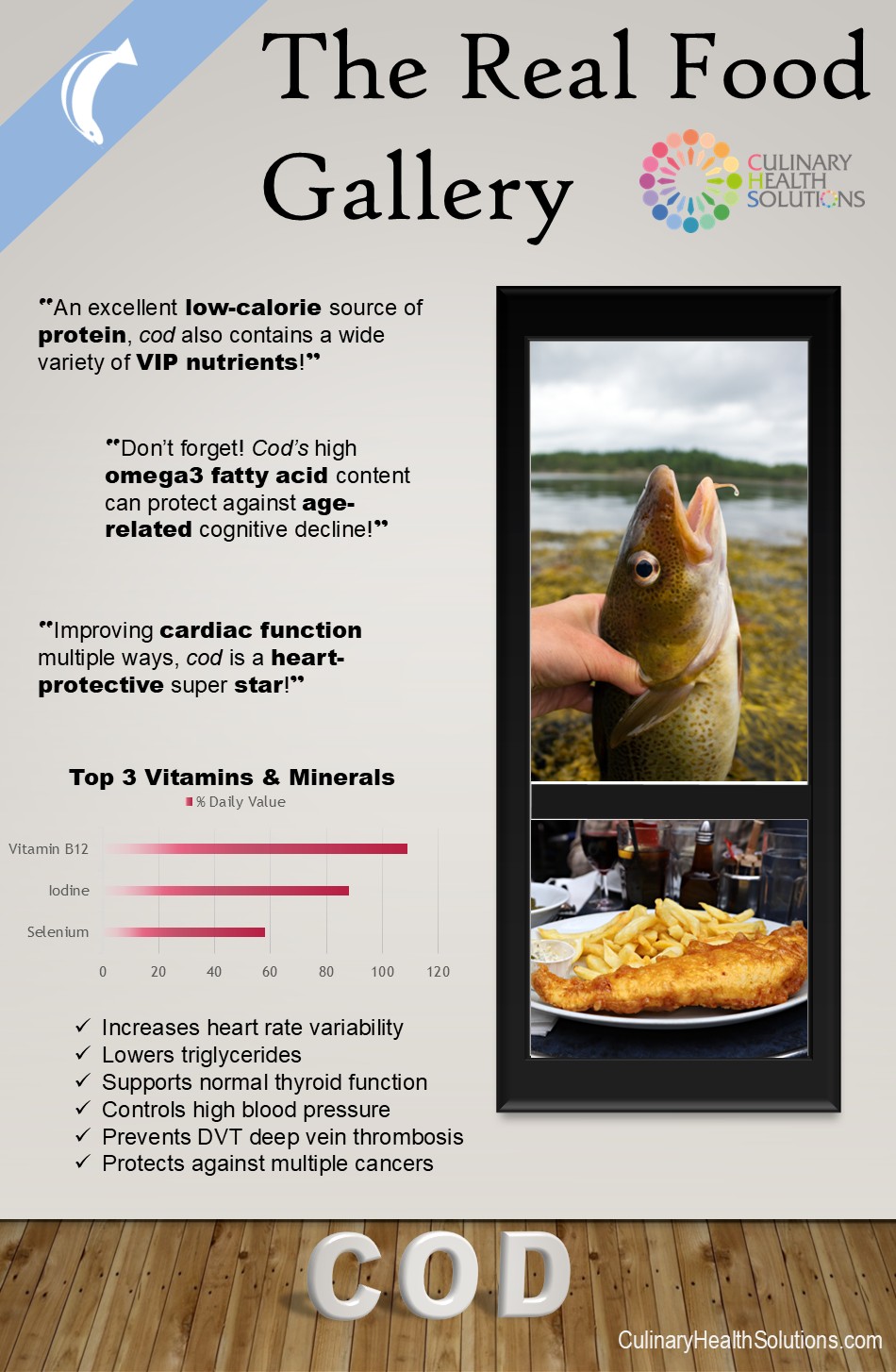Cod

The white, mild flavored flesh of cod is available throughout the year and is a wonderful substitute for meat protein with its versatility making it easily adaptable to all methods of cooking.
Cod belong to the same family along with both haddock and pollock. It's not surprising that the words "cod" and "cold" are so similar since cod need the cold, deep, Arctic waters to grow, reproduce and survive.
Besides being an excellent low-calorie source of protein (a four ounce serving of cod contains over 21 grams), cod contains a variety of very important nutrients and has also been shown to be useful in a number of different health conditions.
Fish, particularly cold water fish like cod, have been shown to be very beneficial for people with atherosclerosis and diabetic heart disease. Studies show that people who eat fish regularly have a much lower risk of heart disease and heart attack than people who don't consume fish. Cod, specifically, promotes cardiovascular health because it is a good source of blood thinning omega3 fatty acids as well as an excellent source of vitamin B12 and a good source of vitamin B6, both of which are needed to keep homocysteine levels low. This is important because homocysteine is a dangerous molecule that is directly damaging to blood vessel walls, and high homocysteine levels are associated with a greatly increased risk of heart attack and stroke(homocysteine is also associated with osteoporosis, and a recent study found that osteoporosis occurred more frequently
among women whose vitamin B12 status was deficient or marginal compared with those who had normal B12 status.) Cod is also a very good source of niacin, another B vitamin that is often used to lower high cholesterol levels, something else that can lead to heart disease.
The selenium and omega3 fats concentrated in cod have anti-inflammatory actions that reduce the inflammation that can lead to asthma attacks, rheumatoid arthritis and osteoarthritis, and even migraines. Studies have shown that children who eat fish several times a week are at a much lower risk of developing asthma than children who don't eat fish. The selenium in cod helps prevent asthma attacks by regenerating antioxidants that are used to reduce the free radical damage that can lead to severe attacks. Selenium is indirectly responsible for keeping the body's supply of at least three vitally important antioxidants intact: these are vitamin C, glutathione, and vitamin E. Although the chemistry of these relationships is complicated, it centers around an enzyme (protein molecule in the body that helps "jump start" a chemical reaction) called glutathione peroxidase. This enzyme cannot function without selenium.
The essential fatty acids found in cod have also been shown to prevent the progression of osteoarthritis and rheumatoid arthritis. In fact, in societies where fish is eaten regularly, the rate of rheumatoid arthritis is much lower than in areas where fish is not commonly eaten. The anti-inflammatory actions of the omega3 fats found in cod reduce the inflammation that is central to the symptoms and progression of rheumatoid and osteoarthritis, and may also help prevent migraine attacks, which are triggered by an inflammatory cascade that spreads from neuron to neuron in the brain called spreading depression. A four ounce serving of cod provides 13% of the daily value for these beneficial omega3 fats.
Another benefit of omega3s anti-inflammatory effects may be their ability to protect our skin against sunburn, and possibly, skin cancer. Although our increased susceptibility to skin cancer is usually blamed on damage to the ozone layer, dietary changes over the last 75 years, which have resulted in excessive consumption of omega6 fatty acids and insufficient consumption of omega3 fats, may also be causing human skin to be more vulnerable to damage from sunlight.
Research by Dr Lesley Rhodes, Director of the Photobiology Unit at the University of Manchester, UK, suggests that eating more omega3rich fish, such as cod, could lessen the inflammation induced by UVB radiation and help prevent not only the damaging effects of sunburn, but possibly skin cancer as well. In a paper published in January 2005 in the Journal of Investigative Dermatology, Rhodes explored the ability of omega3s to protect epidermal and dermal skin cells against UVB-induced triggering of tumor necrosis factor alpha, a molecule that induces the production of the proinflammatory cytokine, IL8. Both EPA and DHA significantly suppressed TNF-alpha-induced IL8 secretion—by 54% in the case of EPA and 42% by DHA. In an earlier one of Dr Rhodes studies, published in the May 2003 issue of Carcinogenesis, 42 healthy volunteers were given a measured dose of ultraviolet light, then divided into two groups. One group was given a daily 4 gram omega3 fish oil supplement, while the other group received olive oil. After three months, when their responses to ultraviolet light were again measured, the skin cells of volunteers receiving fish oil
experienced significantly less DNA damage, leading Rhodes to suggest that increasing consumption of omega3rich fish might reduce skin cancer in humans.
